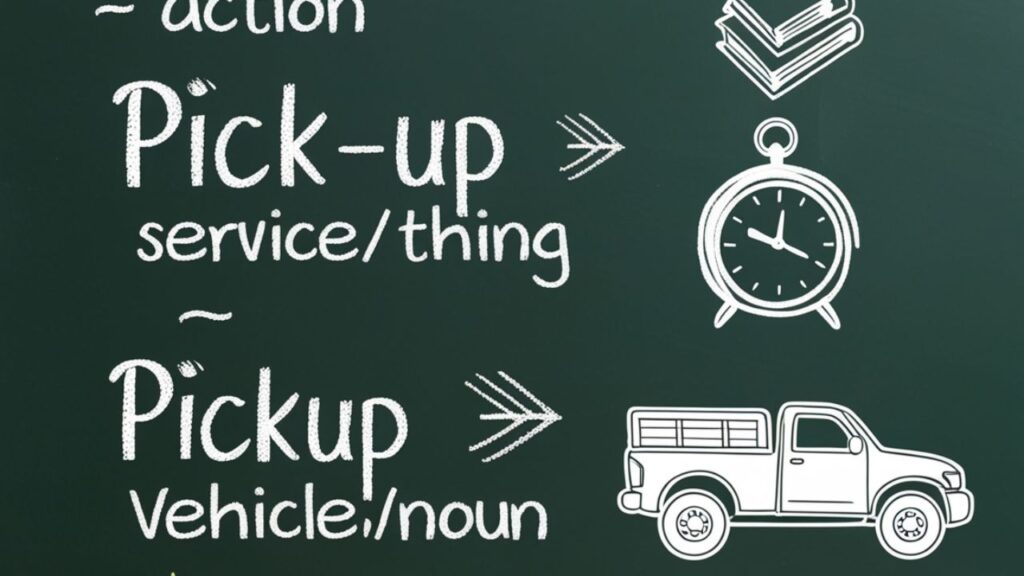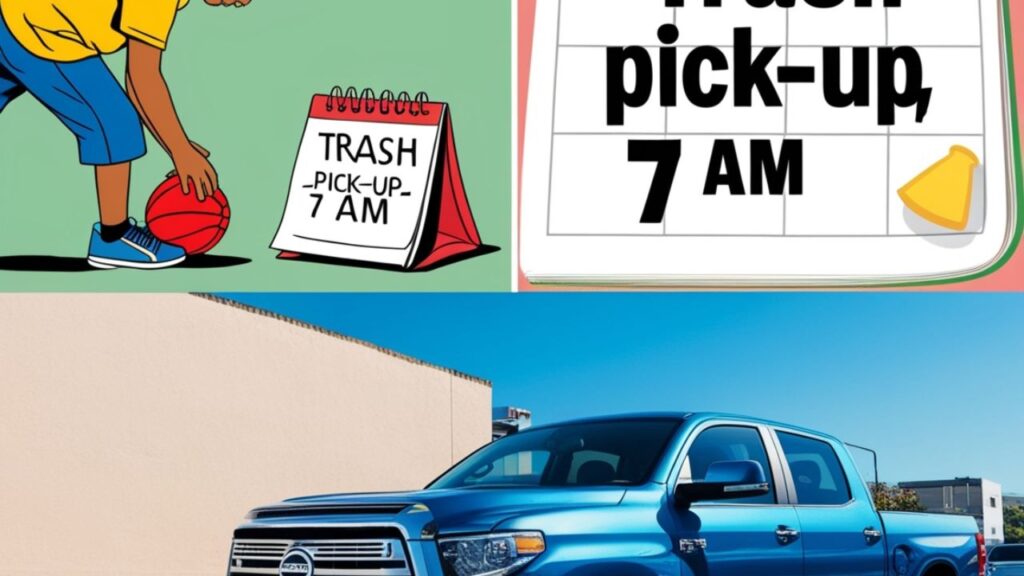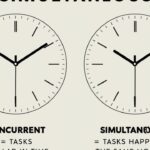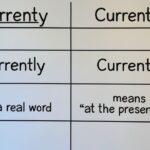The words Pick Up, Pick-Up, and Pickup look the same, but they mean different things. Using the right word helps you write clearly and makes your sentence easy to understand.
The phrase Pick Up shows an action. For example, you can say “I will pick up my toy.” It always has two words, and it tells us someone is doing something.
The word Pickup or Pick-Up is a thing. It can mean a pickup truck or a service, like a trash pick-up. These words name something instead of showing an action.
Why Do Pick-Up, Pick Up and Pickup Cause Confusion?
Many children and even adults mix up Pick Up, Pick-Up, and Pickup. They sound the same but mean different things. This makes reading and writing confusing if the wrong word is used.
The phrase Pick Up shows action, while Pick-Up and Pickup name a thing. Learning these small changes helps everyone understand the English language more easily and write clearly.
What Is Pick Up? Understanding the Verb Phrase
The phrase Pick Up is a verb. It shows an action like lifting, collecting, or learning something. For example, you can pick up toys, books, or even new words.
When you use Pick Up, it always stays as two words. This form tells us about doing something. It is simple and helpful for showing actions in sentences.
- I will pick up my bag from the table.
- She will pick up her little brother after school.
- They will pick up apples from the ground.
- He wants to pick up new words in class.
- We should pick up the toys before dinner.
What Is Pick-Up? The Hyphenated Noun or Adjective

The word Pick-Up has a hyphen. It is not an action but a name for something. For example, a pick-up truck is a type of vehicle, and a pick-up service is for collecting items.
We use Pick-Up when talking about a time, service, or thing. For example, “The trash pick-up is tomorrow.” The hyphen joins the words to show they belong together as one idea.
- The trash pick-up is on Monday.
- He drives a pick-up truck.
- We arranged a pick-up service for parcels.
- The pick-up time is at 3 p.m.
- She booked a pick-up at the airport.
Read More : Pre vs Post: Master Prefix Usage for Clear Writing
What Is Pickup? The Compound Noun
The word Pickup is written as one word. It is a noun. People use it for a pickup truck or a service, like a courier offering same-day pickup for parcels.
In American English, Pickup often names a vehicle or a collection. For example, “The pickup arrived early.” This form does not show action, it names a thing.
- She bought a new pickup last week.
- The courier offers same-day pickup.
- His red pickup is very fast.
- We arranged a pickup for the package.
- The pickup arrived earlier than expected.
When to Use Pick Up or Pickup
We use Pick Up when talking about an action. For example, “I will pick up the ball.” It always shows something someone does, like collecting or lifting.
We use Pickup when naming a thing. For example, “He bought a new pickup truck.” It also means a service, like a courier pickup for parcels or goods.
| Situation | Use Form | Example |
|---|---|---|
| Describing an action | pick up (verb phrase) | I will pick up the parcel. |
| Naming a vehicle or object | pickup (noun) | He owns a red pickup. |
| Describing something | pick-up (adjective) | The pick-up truck is fast. |
Examples in Real-Life Contexts
In daily life, we use Pick Up to show action. For example, “Please pick up your shoes.” It is also used for collecting things like books, toys, or parcels.
We use Pick-Up or Pickup for naming. For example, “The trash pick-up is today” or “He drives a pickup truck.” These words name objects, times, or services.
- Please pick up your books from the floor.
- The trash pick-up is every Friday morning.
- He bought a red pickup last year.
- Parents must pick up children after school.
- We arranged a pick-up service for parcels.
Tips to Overcome Pick-Up, Pick Up or Pickup Confusion

To avoid mistakes, remember Pick Up is always an action. Use it when someone is doing something, like “I will pick up my bag” or “She will pick up toys.”
Use Pick-Up or Pickup when naming a thing. A pick-up can mean service or time, while pickup often means a truck or a collection offered by companies.
- Use pick up only for actions.
- Use pick-up for services or times.
- Use pickup for trucks or objects.
- Read the sentence aloud for clarity.
- Remember: action = two words, thing = one word.
Synonyms for Pick Up and Pickup
The phrase Pick Up has many easy synonyms. You can say collect, fetch, gather, or take instead of pick up. These words also show action in simple sentences.
The word Pickup or Pick-Up also has synonyms. You can use truck, vehicle, delivery, or collection. These words make writing clear and help avoid repeating pickup too often.
| Term | Synonyms |
|---|---|
| pick up (verb) | collect, gather, fetch, retrieve |
| pick-up (noun) | collection, retrieval, gathering |
| pickup (noun) | truck, vehicle, collection |
Read another More : Leafs vs Leaves Explained: Plural Rules in English
FAQs About Pick-Up, Pick Up and Pickup
Which is correct, pick up or pickup?
Use pick up for an action, and pickup as a noun. Both are correct, but meaning depends on sentence context.
Is there a dash in pickup?
The word pickup has no dash. A hyphen appears only in pick-up when used as a compound noun or adjective.
Is it pick up or pickup time?
The correct form is pick-up time with a hyphen. It names a scheduled event, not an action, so hyphenation is required.
Are pick up and drop off hyphenated?
Yes, write them as pick-up and drop-off when used as nouns or adjectives. Keep them separate words when showing actions.
Final Thoughts
In conclusion, knowing the difference between Pick Up, Pick-Up, and Pickup makes writing simple and clear. Each word has its own meaning, so using the correct form helps avoid mistakes in sentences.
Understanding when to use Pick Up for actions, Pick-Up for services, and Pickup for vehicles or collections will build confidence. With practice, these words become easy, and your English will look correct every time.

Join Bibcia on a journey to master English grammar. Discover easy lessons, writing tips, and practical examples designed to make learning grammar simple and effective.










